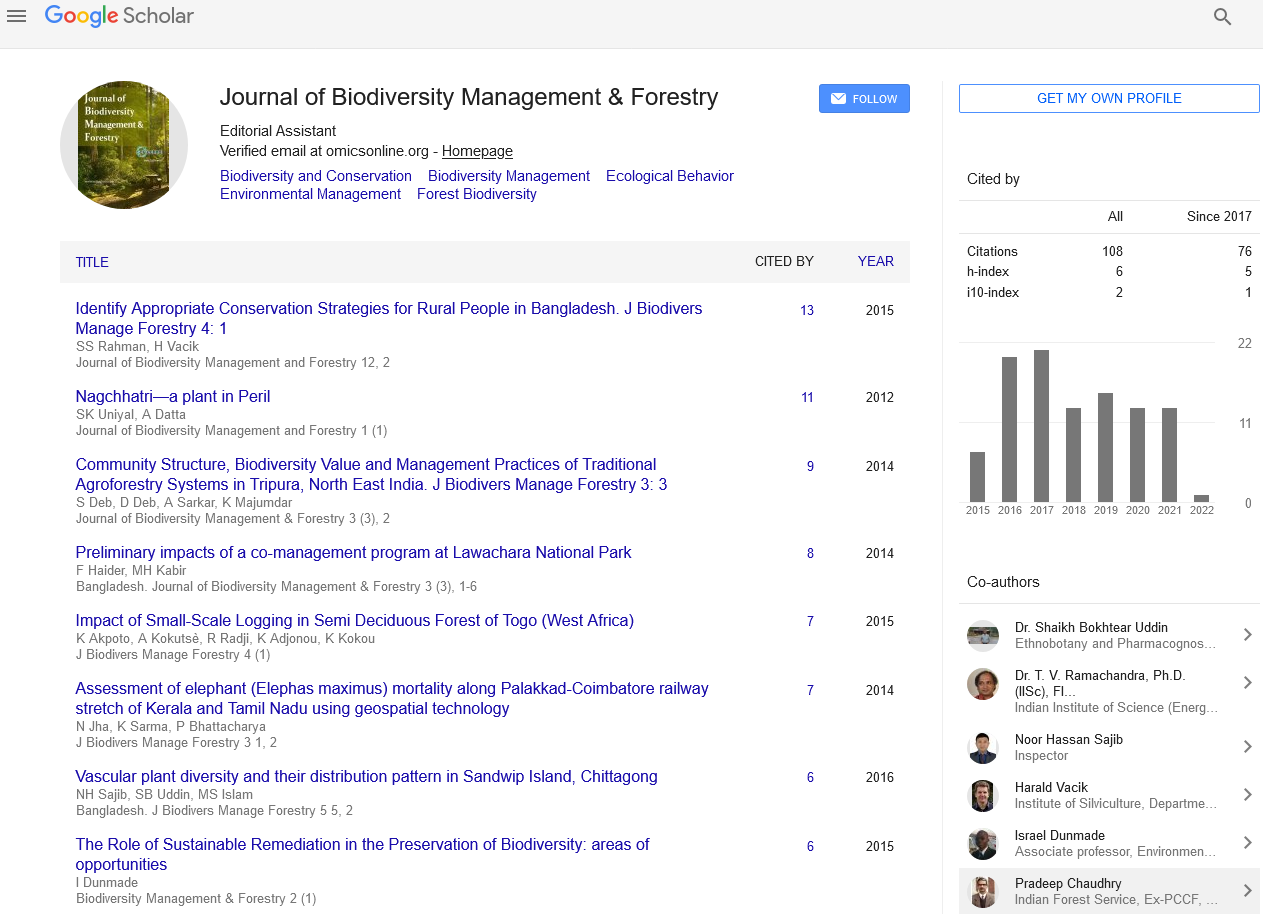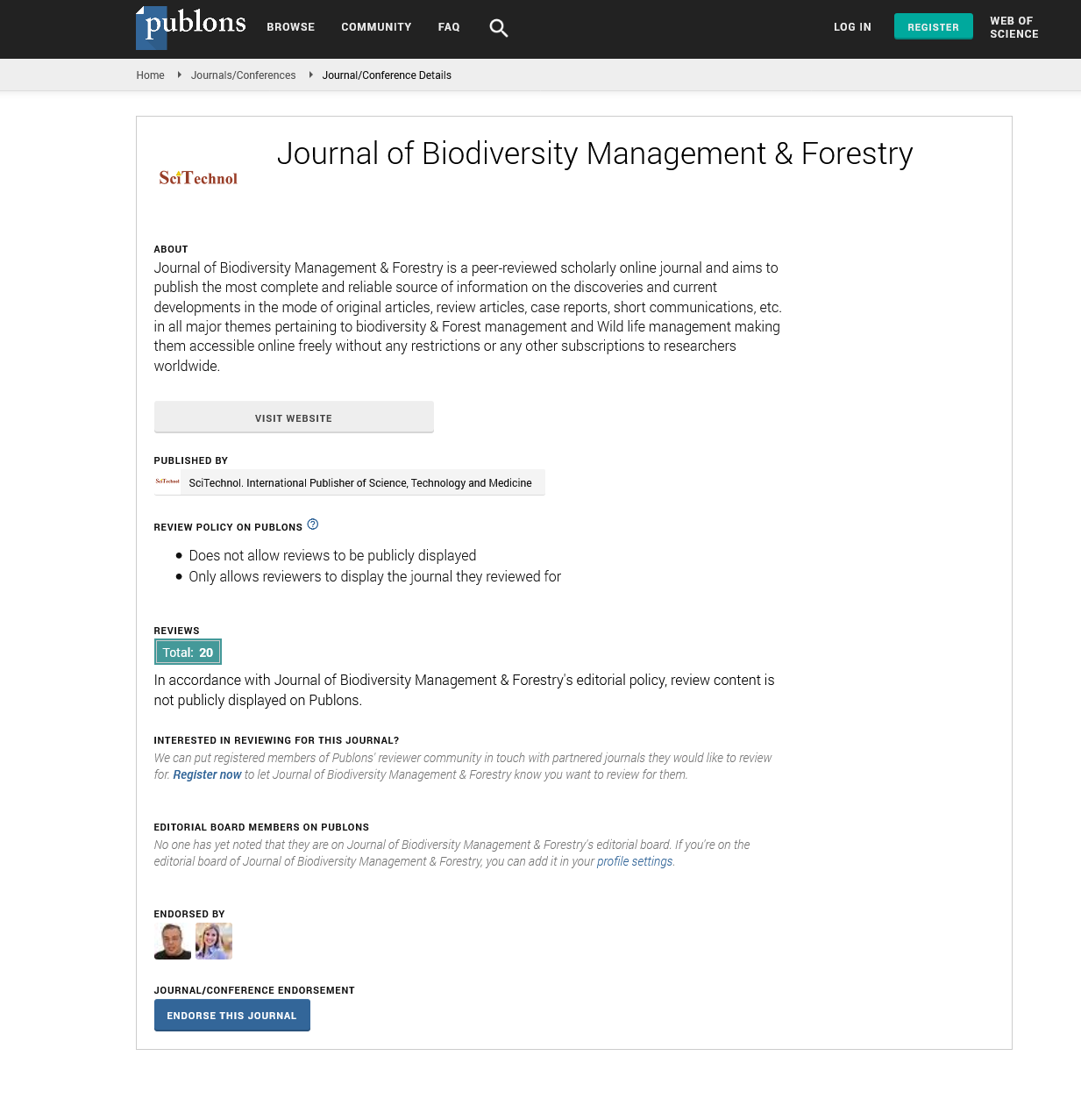Short Communication, J Biodivers Manage Forestry Vol: 12 Issue: 1
Promoting Biodiversity in Forests for Sustainable Forest Management
James Nicholas*
1Department of Forest Resources Management, University of British Columbia, Vancouver, Canada
*Corresponding Author: James Nicholas
Department of Forest Resources
Management, University of British Columbia, Vancouver, Canada
E-mail: jnic@studnt.ubc.ca
Received date: 27 January, 2023, Manuscript No. JBMF-23-95521;
Editor assigned date: 30 January, 2023, Pre QC No. JBMF-23-95521(PQ);
Reviewed date: 15 February, 2023, QC No. JBMF-23-95521;
Revised date: 22 February, 2023, Manuscript No. JBMF-23-95521(R);
Published date: 28 February, 2023, DOI: 10.4172/jbmf 2327-4417.10026
Citation: Nicholas J (2023) Promoting Biodiversity in Forests for Sustainable Forest Management. J Biodivers Manage Forestry 12:1.
Description
Forests are an essential part of the earth's ecosystem, providing numerous ecological, economic, and social benefits. They are home to an astonishing variety of species, from majestic trees to diverse flora and fauna. This rich array of life forms is collectively known as biodiversity, which encompasses the genetic, species, and ecosystem diversity found in forests. Biodiversity is important to the health and sustainability of forests, and its preservation is intrinsically linked to sustainable forest management practices [1].
Biodiversity in forests is essential for maintaining ecosystem resilience, stability, and productivity. It plays an important role in regulating climate, water cycles, and nutrient cycles, and supports pollination, seed dispersal, and natural pest control [2]. Biodiversity also provides cultural, recreational, and aesthetic values, as forests are often considered sacred or culturally significant by indigenous communities and serve as popular destinations for ecotourism and recreation. Furthermore, forests are a significant source of livelihood for many communities, providing timber, non-timber forest products, and ecosystem services that support local economies [3].
However, forests and their biodiversity face unprecedented threats, including deforestation, habitat degradation, climate change, invasive species, and illegal logging. These threats, if left unchecked, can lead to the loss of biodiversity and disrupt forest ecosystems' delicate balance, resulting in negative impacts on human well-being and the health of our planet [4].
To ensure the long-term health and sustainability of forests, Sustainable Forest Management (SFM) practices are essential. SFM is a holistic approach that aims to balance the ecological, social, and economic aspects of forest management, integrating the needs of present and future generations [5]. SFM promotes responsible forest practices that conserve and enhance biodiversity, maintain ecosystem services, and support the well-being of local communities [6].
One key principle of SFM is maintaining or enhancing biodiversity. This involves protecting and conserving critical forest habitats, such as old-growth forests, riparian zones, and high conservation value areas, which are hotspots of biodiversity. It also includes promoting sustainable logging practices that minimize impacts on biodiversity, such as selective logging or reduced impact logging, which minimize the felling of non-target species, protect key habitats, and maintain natural regeneration processes [7].
Another important aspect of SFM is promoting forest landscape restoration and rehabilitation efforts. This involves restoring degraded forests, rehabilitating logged areas, and replanting trees to restore biodiversity and ecosystem functions. Forest landscape restoration can also involve connecting fragmented forests to facilitate the movement of species and promote gene flow, thereby enhancing genetic diversity and promoting ecosystem resilience [8].
In addition to protecting and restoring biodiversity, SFM also emphasizes the inclusion of local communities in forest management decisions. Indigenous peoples and local communities have been the custodians of forests for generations and possess invaluable traditional knowledge and practices that contribute to biodiversity conservation. Involving them in forest management decision-making processes, recognizing their rights to land and resources, and providing them with sustainable livelihood opportunities can empower them as stewards of the forest and promote their well-being [9].
SFM also promotes the sustainable use of forest resources. This includes implementing sustainable logging practices that comply with international standards, such as Forest Stewardship Council (FSC) certification, which ensures that timber is harvested in an environmentally and socially responsible manner. SFM also encourages the diversification of forest-based livelihoods, such as non-timber forest product harvesting, ecotourism, and forest-based enterprises, to reduce reliance on logging and promote sustainable economic development [10].
Conclusion
Furthermore, SFM emphasizes the importance of monitoring, assessment, and research to inform forest management decisions. This involves conducting regular inventories of forest resources, monitoring changes in biodiversity, assessing the impacts of forest management practices, and incorporating scientific knowledge into forest management plans. Biodiversity and sustainable forest management are important components in preserving the natural environment and promoting sustainable development. Sustainable forest management practices can help maintain and enhance biodiversity, which is essential for ecological resilience, as well as support the livelihoods and well-being of local communities. Additionally, sustainable forest management can contribute to mitigating climate change by sequestering carbon and reducing greenhouse gas emissions.
References
- Kooten GCV, Nelson HW, Vertinsky I (2005) Certification of sustainable forest management practices: a global perspective on why countries certify. For Policy Econ 7(6): 857-867.
- Bianchi FJJA, Booij CJH, Tscharntke T (2006) Sustainable pest regulation in agricultural landscapes: a review on landscape composition, biodiversity and natural pest control. Proc R Soc Lond B Biol Sci 273(1595): 1715-1727.
- Daily GC (1997 ) Introduction: what are ecosystem services. Nature’s services: Societal dependence on natural ecosystems 1(1):
- Kiera DA, Michelsen MK, Carpenter CL (2023) Modern diets and the health of our planet: An investigation into the environmental impacts of food choices. Nutrients 15(3): 692.
- Kang BT (1997) Alley cropping—soil productivity and nutrient recycling. For Ecol Manag 91(1): 75-82.
- Isbell F, Calcabno V, Hector A, Connolly J, Harpole WS et al. (2011) High plant diversity is needed to maintain ecosystem services. Nature 477(7363): 199-202.
- Chazdon RL, Guariguata MR (2016) Natural regeneration as a tool for large‐scale forest restoration in the tropics: prospects and challenges. Biotropica 48(6): 716-730.
- Cote IM, Darling ES (2010) Rethinking ecosystem resilience in the face of climate change. PLoS biology 8(7): e1000438.
- Kauppi PE, Sandstrom V, Lipponen A (2018) Forest resources of nations in relation to human well-being. PloS one 13(5): e0196248.
- Dabbous A, Tarhini A (2021) Does sharing economy promote sustainable economic development and energy efficiency? Evidence from OECD countries. J INNOV KNOWL 6(1): 58-68.
 Spanish
Spanish  Chinese
Chinese  Russian
Russian  German
German  French
French  Japanese
Japanese  Portuguese
Portuguese  Hindi
Hindi 
